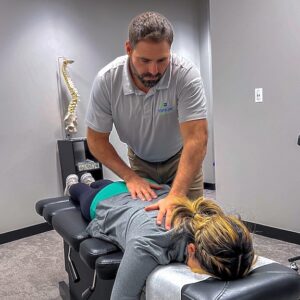If you’ve been experiencing the persistent discomfort and pain associated with degenerative disc disease, you’re not alone. This common condition can take a toll on your quality of life, making even the simplest tasks a challenge. While there are various treatment options available, chiropractic care is one approach that’s gained attention for its potential benefits. In this article, we will explore the world of chiropractic services and how they can positively impact individuals dealing with degenerative disc disease.
Understanding Degenerative Disc Disease
Before delving into the advantages of chiropractic care, let’s grasp the basics of degenerative disc disease. This condition affects the intervertebral discs in your spine, causing them to wear down over time. These discs act as cushions between the vertebrae, facilitating movement and absorbing shock. However, with age, injury, or other factors, they can deteriorate, leading to pain, stiffness, and reduced mobility.
Common symptoms of degenerative disc disease include:
Back Pain: Back pain is the hallmark symptom of degenerative disc disease. This pain typically occurs in the lower back but can also affect the neck or upper back, depending on the location of the affected discs. The pain can range from mild discomfort to severe, debilitating pain. It often presents as a dull, aching sensation and may be intermittent or constant.
Intermittent or Constant Discomfort: Individuals with degenerative disc disease often experience ongoing discomfort. The severity of this discomfort can vary, and it may be intermittent, meaning it comes and goes, or constant, with a persistent presence that affects daily activities and quality of life.
Reduced Flexibility: Stiffness and reduced flexibility are common complaints among those with degenerative disc disease. As the discs between the vertebrae wear down, they can limit the spine’s natural range of motion. This can make everyday activities like bending, twisting, or reaching more challenging.
Tingling or Numbness: In some cases, degenerative disc disease can lead to symptoms such as tingling or numbness. This occurs when the affected discs put pressure on nearby nerves. If the condition affects the lumbar spine (lower back), these sensations may radiate down the legs. In cases involving the cervical spine (neck area), the symptoms can extend into the arms and hands.
Pain Radiating to Other Areas: The pain associated with degenerative disc disease is not always localized to the spine. Depending on the location of the affected discs and the extent of nerve compression, the pain may radiate to other areas of the body. For example, in lumbar degenerative disc disease, the pain can radiate into the buttocks, thighs, or even the feet. Similarly, cervical degenerative disc disease may cause pain to travel into the shoulders or down the arms.
Worsening of Symptoms with Activity: Individuals with degenerative disc disease often notice that their symptoms worsen with certain activities. These may include lifting heavy objects, prolonged sitting or standing, and repetitive movements. The increased pressure on the already compromised discs can lead to heightened discomfort and pain.
Chiropractic Care: A Holistic Approach
Chiropractic care is a healthcare discipline that focuses on the diagnosis, treatment, and prevention of musculoskeletal disorders, particularly those related to the spine. Chiropractors are healthcare professionals who use their hands or specialized instruments to apply controlled and targeted force to specific areas of the spine. The aim is to correct misalignments, improve spinal function, and promote the body’s natural ability to heal itself.
How Chiropractic Services Work
Chiropractors employ a variety of techniques to address degenerative disc disease, and the specific approach may vary depending on the individual’s condition. Here’s a general overview of what you can expect when seeking chiropractic services for degenerative disc disease:
Evaluation: Your chiropractor will perform a thorough assessment of your medical history, symptoms, and conduct physical examinations, which may include X-rays or other diagnostic imaging.
Spinal adjustments: Using precise and controlled force, the chiropractor will perform spinal adjustments to realign the vertebrae and reduce pressure on the affected discs.
Therapeutic exercises: Chiropractors often prescribe specific exercises and stretches to improve posture, flexibility, and overall spinal health.
Lifestyle recommendations: You will receive guidance on ergonomics, nutrition, and other lifestyle factors that can positively impact your condition.
Now, let’s explore the benefits of chiropractic care for degenerative disc disease.
Benefits of Chiropractic Care for Degenerative Disc Disease
1. Pain Management
One of the primary reasons individuals seek chiropractic care for degenerative disc disease is to manage pain. Chiropractic adjustments can provide relief from the discomfort associated with this condition. By realigning the spine and reducing pressure on the affected discs, chiropractors aim to alleviate pain and restore comfort to their patients.
2. Improved Mobility
Degenerative disc disease can lead to stiffness and reduced flexibility. Chiropractic care focuses on restoring proper spinal alignment, which, in turn, can enhance your range of motion. This improved mobility can make it easier to perform daily activities and engage in physical exercises, which are essential for maintaining a healthy spine.
3. Avoiding Surgery
For many individuals, the prospect of surgery to address degenerative disc disease can be daunting. Chiropractic care offers a non-invasive alternative. By working to alleviate symptoms and improve spinal health through natural means, chiropractors may help some patients avoid the need for surgical interventions.
4. Personalized Treatment
Chiropractic care is highly individualized. Your chiropractor will assess your specific condition and tailor the treatment plan to meet your unique needs. This personalized approach ensures that you receive the most effective care for your degenerative disc disease.
5. Minimal Side Effects
Unlike some medical interventions, chiropractic care typically comes with minimal side effects. Patients may experience some soreness or mild discomfort after an adjustment, but this is usually temporary. It’s a stark contrast to the potential risks and complications associated with surgery or long-term medication use.
6. Holistic Health Focus
Chiropractors often emphasize the importance of overall health and wellness. They may offer guidance on nutrition, exercise, and lifestyle changes to support your recovery and promote a healthy spine. This holistic approach can be especially beneficial for individuals with degenerative disc disease, as it addresses the condition from multiple angles.
7. Conservative Approach
Chiropractic care is considered a conservative treatment option. It’s typically recommended before more invasive procedures like surgery or long-term medication use. Many individuals prefer to explore less invasive alternatives first, making chiropractic care an attractive choice.
8. Long-Term Maintenance
Chiropractic care isn’t just about symptom relief; it’s also about long-term maintenance and prevention. Your chiropractor can work with you to develop a plan that focuses on keeping your spine healthy and minimizing the risk of future issues related to degenerative disc disease.
Safety and Risks
Chiropractic care, when performed by a licensed and experienced chiropractor, is generally considered safe for most individuals. Chiropractors undergo extensive training and education to ensure they have the knowledge and skills needed to perform spinal adjustments and other chiropractic techniques safely. They also follow established guidelines and protocols to minimize risks to patients. Here are some aspects of safety in chiropractic care:
1. Professional Training and Licensing:
Chiropractors complete rigorous educational programs, including a Doctor of Chiropractic (DC) degree from an accredited institution. They are required to pass national board exams and obtain a state license before they can practice. This licensing process helps ensure that chiropractors meet specific standards of competence and safety.
2. Individualized Treatment:
Chiropractic care is personalized based on a thorough evaluation of the patient’s medical history, physical condition, and diagnostic tests. Chiropractors tailor their treatment plans to address the unique needs and health concerns of each patient, minimizing the risk of inappropriate or unnecessary interventions.
3. Patient Screening:
Chiropractors conduct comprehensive assessments to identify any contraindications or potential risks before initiating treatment. They review medical histories, perform physical examinations, and may order imaging studies like X-rays or MRI scans to evaluate the spine’s condition and ensure that chiropractic adjustments are appropriate.
4. Adherence to Best Practices:
Chiropractors adhere to established guidelines and best practices for performing spinal adjustments and other chiropractic techniques. This includes using appropriate force, positioning patients correctly, and selecting the right technique for each specific case.
Potential Risks of Chiropractic Care
While chiropractic care is generally safe, there are potential risks and considerations that individuals should be aware of before undergoing treatment. It’s important to discuss these risks with your chiropractor and make an informed decision. Here are some potential risks associated with chiropractic care:
1. Soreness or Discomfort:
After a chiropractic adjustment, some individuals may experience mild soreness or discomfort in the treated area. This typically resolves within a day or two and is often compared to the soreness experienced after exercising.
2. Rare but Serious Complications:
In rare cases, chiropractic adjustments can lead to more serious complications, such as herniated discs, nerve compression or injury, and worsening of pre-existing conditions. While these occurrences are uncommon, they emphasize the importance of seeking care from a skilled and qualified chiropractor.
3. Risk of Stroke:
There have been isolated reports suggesting a potential link between cervical spine (neck) manipulation and an increased risk of stroke. However, it’s important to note that the overall risk is considered extremely low, and the benefits of chiropractic care often outweigh this minimal risk, especially for non-cervical adjustments.
4. Not Suitable for Certain Conditions:
Chiropractic care may not be appropriate for individuals with certain medical conditions, such as severe osteoporosis, spinal fractures, or those taking blood-thinning medications. Patients with a history of spinal surgeries or specific neurological disorders should also exercise caution and consult their healthcare provider before seeking chiropractic treatment.
Finding the Right Chiropractor
When considering chiropractic care for degenerative disc disease, it’s essential to find a qualified and experienced chiropractor. Here are some tips to help you make the right choice:
Ask for recommendations: Seek referrals from your primary care physician or friends and family who have had positive experiences with chiropractic care.
Check credentials: Ensure the chiropractor is licensed and certified in your state.
Interview potential chiropractors: Schedule initial consultations to discuss your condition and the treatment approach. This will help you assess their experience and compatibility with your needs.
Read reviews: Online reviews and testimonials can provide insights into the chiropractor’s reputation and the experiences of previous patients.
In conclusion, chiropractic care emerges as a promising avenue for individuals grappling with the challenges of degenerative disc disease. This holistic approach to healthcare, centered on spinal adjustments, therapeutic exercises, and personalized treatment plans, addresses not only the symptoms but also the underlying causes of the condition. The benefits are substantial—pain management, enhanced mobility, avoidance of surgery, minimal side effects, and a focus on long-term maintenance. Chiropractic care showcases a conservative and individualized approach, promoting overall well-being while minimizing potential risks. For those seeking a natural and patient-centric path to relief from degenerative disc disease, consulting a qualified chiropractor could be a prudent choice.
Why Choose Us?
Evolve Chiropractic of Downers Grove is a leading chiropractic practice dedicated to providing exceptional healthcare and wellness services to the community of Downers Grove. Our team of highly skilled and compassionate chiropractors is committed to helping patients achieve optimal health and wellness through personalized, evidence-based chiropractic care.
At Evolve Chiropractic, we prioritize patient well-being and strive to deliver the highest standard of care. Our chiropractors employ state-of-the-art techniques and advanced technology to assess, diagnose, and treat a wide range of musculoskeletal conditions and disorders. Whether you’re seeking relief from chronic pain, recovering from an injury, or aiming to improve your overall health, we tailor our treatments to meet your unique needs and goals.
Our clinic provides a welcoming and relaxing environment, ensuring that each patient feels comfortable and at ease during their visit. We believe in educating our patients about their conditions and empowering them to take an active role in their health journey. Through personalized treatment plans and attentive care, we aim to enhance your quality of life and promote long-term wellness.
Experience the difference at Evolve Chiropractic of Downers Grove, where we are dedicated to helping you evolve towards a healthier, pain-free life. Discover why we are recognized as the best chiropractor in Downers Grove by scheduling your appointment today.
Evolve Chiropractic of Downers Grove
2946 Finley Rd, Downers Grove, IL 60515, United States
630-613-9248





